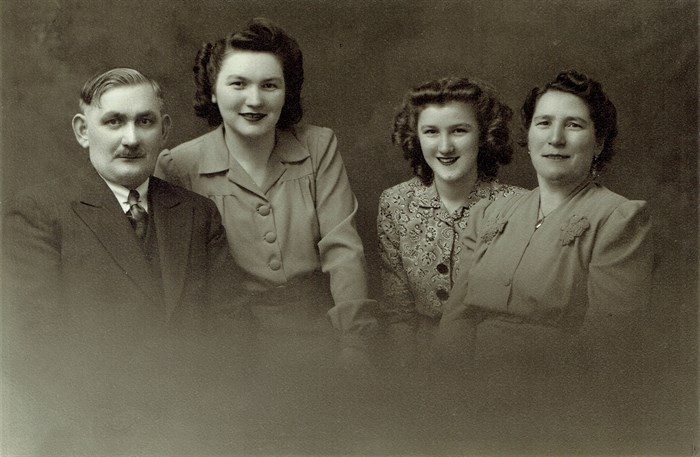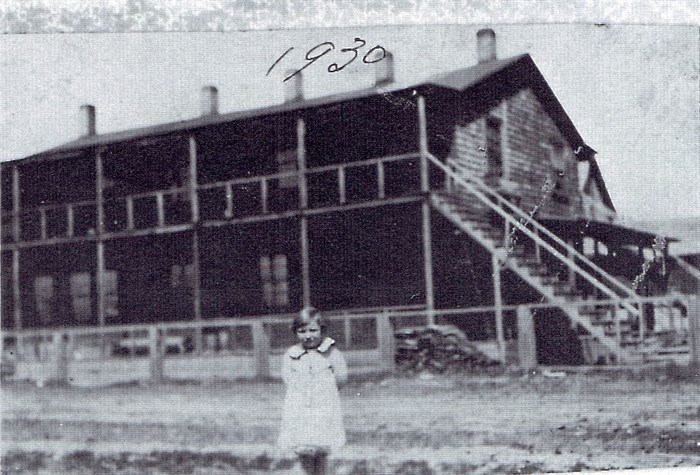
Margaret Wort, (right) with her sister Elizabeth and parents Josef and Elisabeth Follmer in 1947.
Image Credit: SUBMITTED/ Susan Wort
April 20, 2020 - 7:00 AM
Margaret Wort remembers the first time her family had butter in their Kelowna home.
It was during the Second World War, and her mother was allowed one pound of butter per week as part of her wartime rations.
When reflecting on past events and comparing them to the current COVID-19 pandemic, we learn about our capabilities to survive, how our bonds grow in times of crisis and we develop an appreciation for what we already have, she said.
“(During this pandemic) we can learn... that we can get by with a lot less than we think we want,” Wort said, adding that she saw a church sign the other day that aptly said, “this too shall pass.”
Born in Kelowna in 1930, her parents were immigrants born during the former Austro-Hungarian Empire who came to Canada using Romanian passports.
Their arrival was poorly timed during the Great Depression, “only we didn’t know it was the depression, it was just life,” Wort said.
She doesn’t remember much of her early childhood, but her parents, Josef and Elisabeth Follmer scraped by working odd jobs at a tobacco factory on Ellis Street, after coming to Canada with the idea they would strike it rich by buying land and eventually moving back to Europe. That never happened.
“We just lived a perfectly normal life,” she said. “Certain sacrifices were made when rationing came in, but otherwise they went out picking apples, doing whatever.”

Margaret Wort as a young girl in roughly 1934.
Image Credit: SUBMITTED/Susan Wort
Every fall they would butcher their own pig for sausages and raised chickens and rabbits and grew their own vegetables.
They didn’t have refrigerators or an electric stove and life was sort of the same for everyone, Wort said. Living on St. Paul Street north of Bernard Avenue, they were surrounded by other members of the working class
Then the Second World War started in 1939.
“I remember our teacher encouraging us to support the war effort in whatever way we could,” she said, adding they used to march wearing crisp white shirts and navy skirts, “being very military-like and patriotic."
“We made our own fun without any money involved because no one had any money,” she said.
She’s adamant that the pandemic, like every other historical event she’s experienced, will pass.
“Sad times won’t last forever. Some people are already stir crazy having to be in their houses. I’m not. I’ve been in my house for a few years now because of bad health. I depend on my daughter and I certainly believe she’s understanding of the situation,” Wort said.
“I think families are bonding. This (pandemic) has made people reflect and appreciate what they have and be satisfied with what they have,” she said.
Wort recently watched a TV program that reminded her of the past. The cast explained that they were reading, playing games and enjoying activities that they wouldn’t normally do because they previously didn’t have enough time to do it.
READ MORE: Lives Lost: At 97, World War II vet takes a final road
“Although they were afraid of getting bored if this lasts too long, they were making do by contacting family and friends and centering their lives in their home," she said. “There’s a sense of pulling together. Let’s do the best we can.”
While people aren't growing full gardens at their homes as they did in the 1930s, there’s a similar sense of trying to create things at home with the means you have, she said, adding that her daughter has a garden.
READ MORE: iN VIDEO: Take a virtual tour in a vintage World War II plane over Kamloops
Keith Boehmer, historian with the Okanagan Military Museum, said some parallels can be drawn from the 1930s and 40s in terms of food production.
Governments would ration food supplies during the Second World War, similar to how steps have been taken today to counteract hoarding, he said.
Rural farmers would have been able to support local communities, as farms could communicate directly with local populations.
There was also the concept of balancing the community needs with our own individual desires, as individuals were encouraged to support the war efforts, Boehmer said.
To contact a reporter for this story, email Carli Berry or call 250-864-7494 or email the editor. You can also submit photos, videos or news tips to the newsroom and be entered to win a monthly prize draw.
We welcome your comments and opinions on our stories but play nice. We won't censor or delete comments unless they contain off-topic statements or links, unnecessary vulgarity, false facts, spam or obviously fake profiles. If you have any concerns about what you see in comments, email the editor in the link above.
News from © iNFOnews, 2020